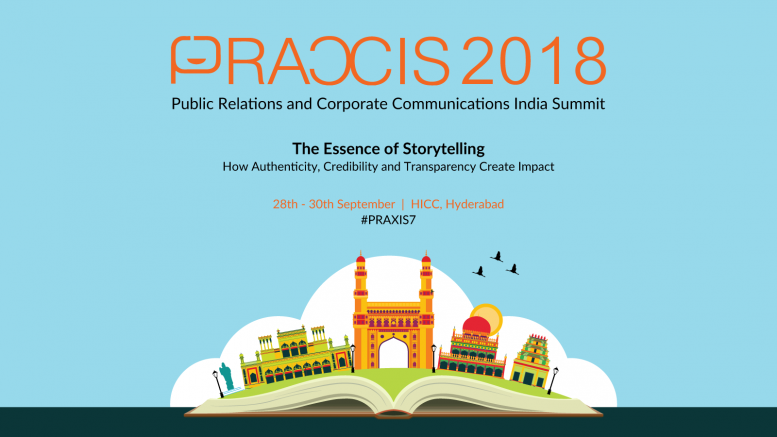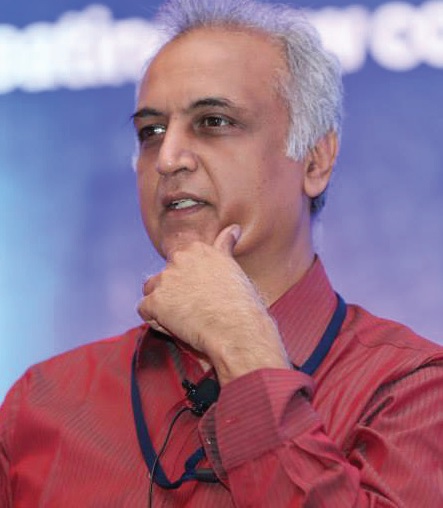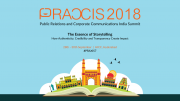It was an enriching experience last week attending ‘Praxis 2018,’ the annual summit — or the grand jamboree, if you will — of India’s public relations community, at Hyderabad, organised by the folks who publish Reputation Today. Such a gathering can be a bit confusing for a journalist as one of a handful of odd ones out from a related yet different profession to be present there. Sometimes I felt like a spy, sometimes like a gatecrasher and sometimes like a rank outsider. But the common thread between the PR professional and the journalist is the “story” — and it is fascinating to watch storytellers telling stories to other storytellers about storytelling, unmindful of the eyes and ears of someone whose idea of a story may be quite different.
Here are my big takeaways from the conference, with my own added “ScribeView” insight on what the journalist would feel in such a context.
- Research the mind, not just the audience: For me, the most interesting session was by Tina McCorkindale, President of the Institute for Public Relations, whose insights from brain science on how empathetic narratives cut into the audience minds were quite valuable. I particularly liked the counter-intuitive way she contrasted the big talk about attention span shortage being seen as a constraint on the one hand and the phenomenon of binge-watching on Netflix on the other. You get the picture: If you hook’em, you got them.
ScribeView take: Journalists look for credibility. Just as there is an important but seemingly thin line dividing seduction from wooing, there is a key point where empathetic storytelling should avoid becoming clever spin doctoring.
- Dubious data is better than no data: Sam Ruchlewicz, Vice President of digital strategy and data analytics at Warschawski, spoke about the importance (and the difficulties) of getting data to quantify the contribution of storytelling to the financial bottomline. I particularly loved the tantalising way he asked people to come out with a rough data point where measurement is difficult and invite contrarian views to fine tune the damn thing!
ScribeView take: Is this the “How to lie with statistics” department? Sourcing is important, and data is helpful, but there is a point where a good anecdote works better than bad data. Only the previous week, I met a grassroots activist who proclaimed: “I am the data” and charmed the audience with her insights based on her personal experiences.
- Professional storytellers need not be the best storytellers: An informal aside at the conference was my meeting Rema Rajeshwari, the Indian Police Service officer who successfully curbed violence triggered by fake news and rumours in Telangana by bringing truth into the formats of popular rural culture through their folktales and music. That’s pure genius, if you ask me. And I sat riveted as transgender activist Gauri Sawant held us spellbound with her tales of fighting for the dignity of her kind. Not a pause out of place!
ScribeView take: Necessity is the mother of invention and so are stories. Communication excels when it comes from the heart.
- Brevity remains the soul of communication: PR veteran Roger Pereira, who received the lifetime award for his contributions to the business, had this to say on the emcee of the Fulcrum awards function, who used to be a much-admired newscaster in the heydays of Doordarshan. “Other people read the news. Rini Simon presented the news.”
As if to prove the power of brevity, digital guru Sree Srinivasan said: “In digital, clear is the new clever”. Gauri Sawant said: “Motherhood is a behaviour. If you love someone and care, you are a mother.”
ScribeView take: A mere word or a carefully-crafted sentence can make all the difference in communication. Have you ever looked at every word as if it was a key to opening a big, strong vault?
All that brings me to the carefully structured title of Praxis 7: “The Essence of Storytelling: How Authenticity, Credibility and Transparency Create Impact”.
Honestly, I thought those three words abbreviating to “ACT” belong more in the domain of journalism and serious art than public relations. I would greatly appreciate anyone from PR believing in those three words. It is too good to be true but is a sign of maturity in the industry. However, as a realistic (cynical?) journalist, I can only ask a simple question to my reputation management friends: You have clients who believe in authenticity, credibility and transparency? All the way? Seriously?







Be the first to comment on "When storytellers tell stories about storytelling: My takeaways from Praxis 7"